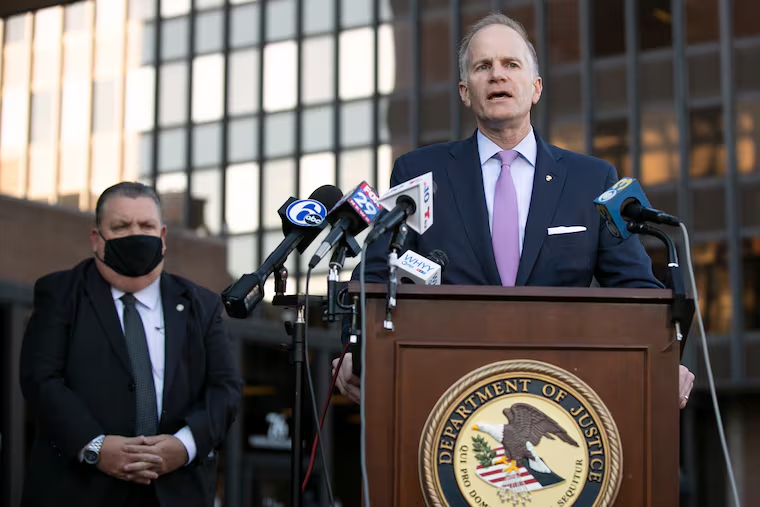Bill McSwain’s reign as U.S. attorney is ending. Can Biden undo the damage? | Opinion
Philadelphia deserves a U.S. attorney who is a partner in criminal justice reform and overdose prevention.

As is customary when a presidential administration changes, William McSwain announced his resignation on Thursday. The soon-to-be-former U.S. attorney for the Eastern District of Pennsylvania was appointed by President Donald Trump and sworn into office in 2018. Now that he’s stepping down, it is critical for the Biden administration to prioritize healing some of the wounds that his tenure created.
In his time as the highest federal law enforcement officer in the region, McSwain’s office time and again sued, overstepped, and publicly denounced policies of public officials — who were elected by a majority of Philadelphia voters and represent the will of the people. He seemed most intent on building his own profile, using tax dollars to plaster his face on billboards.
» READ MORE: U.S. Attorney William McSwain resigns after a tenure marked by high-profile cases, public feud with Krasner
During his tenure, McSwain was harmful in many ways. He cherry-picked anecdotes about particularly heinous crimes to dishonestly indict Philadelphia’s status as a sanctuary city and the city’s movement toward criminal justice reform. As coronavirus cases increased exponentially, he joined a lawsuit to challenge Philadelphia’s ability to refuse parade permits. (Thankfully, that effort failed. ) Additionally, he was not beyond invoking offensive rhetoric. Take for example, his comments in February 2020 at the Union League when he compared Mayor Jim Kenney and District Attorney Larry Krasner to slaveholders and civil rights opponents because of their support for supervised injection sites and sanctuary cities.
Moving forward after McSwain will take some time, most notably his effort to prevent Philadelphia from opening a supervised injection site when more people have been dying from overdose than ever.
McSwain’s resignation came just days after the effort to help prevent overdose deaths in Philadelphia suffered a defeat in court. On Tuesday, a federal appeals court ruled that a supervised injection site, the lifesaving intervention that has demonstrated success all over the world, would violate federal law.
» READ MORE: A federal appeals court rejects plans for a supervised injection site in Philly
In February 2019, McSwain sued Safehouse, a nonprofit that worked to open a supervised injection site in Philadelphia. In the suit, McSwain alleged that the site would violate a federal law known as the “crack-house statute” and asked the federal court to order Safehouse never to open.
A district judge ruled against McSwain in October 2019, arguing that the purpose of supervised injection sites is to save lives and not drug use. McSwain appealed.
On Jan. 12, the Third Circuit Court of Appeals reversed the district judge’s decision, stating: “Congress has made it a crime to open a property to others to use drugs. And that is what Safehouse will do.” The nonprofit’s “benevolent motive makes no difference,” the judge added.
The timing of the ruling is extremely frustrating. Had the court waited for eight days, President Joe Biden’s Department of Justice would have had an opportunity to withdraw the case. The final ruling on the issue would have been from the district court and Safehouse could have progressed with its critical and lifesaving mission. Now, with a ruling in place, things are more complicated.
Circuit court rulings are only binding within that circuit — in the Third Circuit’s case Delaware, New Jersey, Pennsylvania, and the U.S. Virgin Islands. The current ruling, even though it will not be binding outside of the circuit, could be cited and used in cases elsewhere, making efforts to save lives and promote harm reduction harder. It could also have a chilling effect, stoking fear in public health practitioners that an effort to prevent overdose can earn them a federal felony and up to 20 years in prison.
An appeal is an option, but Safehouse’s backers will need to weigh the potential risk. A Supreme Court decision affirming the appeals ruling would set precedent for the entire country.
The ruling, however, is far from the end of the story for America’s first legal supervised injection site. While the court ruled that the crack-house statute could be used against sites, the law does not have to be applied. Take for example, marijuana dispensaries, which should also be considered “crack houses” under a plain reading of federal law. However, in 2013 the DOJ issued the Cole memo, which ordered prosecutors not to raid dispensaries in states with legalized marijuana. Biden’s DOJ can — and should — issue a similar nonenforcement memo for supervised injection sites in their first days in office, reopening the possibility of Safehouse’s legal opening in Philadelphia.
» READ MORE: If you support marijuana legalization, you should support supervised injection sites | Opinion
McSwain’s resignation opens the door for Joe Biden to help ensure a safer and more just Philadelphia. Biden should appoint a U.S. attorney who has extensive experience in civil rights and could be a partner, not adversary, in the city’s criminal justice reform efforts. In addition, to ensure that life saving efforts do not hinge on the whims of DOJ memos, Biden should also direct Congress to legislate exemptions from drug laws to public health overdose prevention efforts.
With an open senatorial and gubernatorial races in 2022, McSwain could be back soon. Until then, it’s time to take down the billboards and appoint a U.S. attorney who will fight with, not against, Philadelphia.